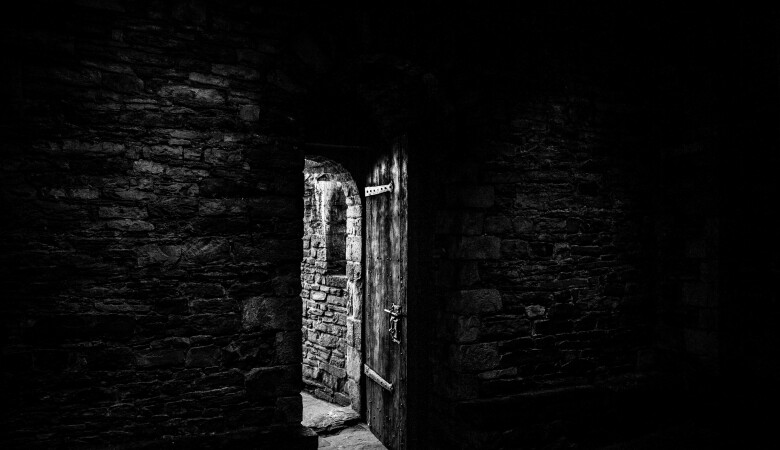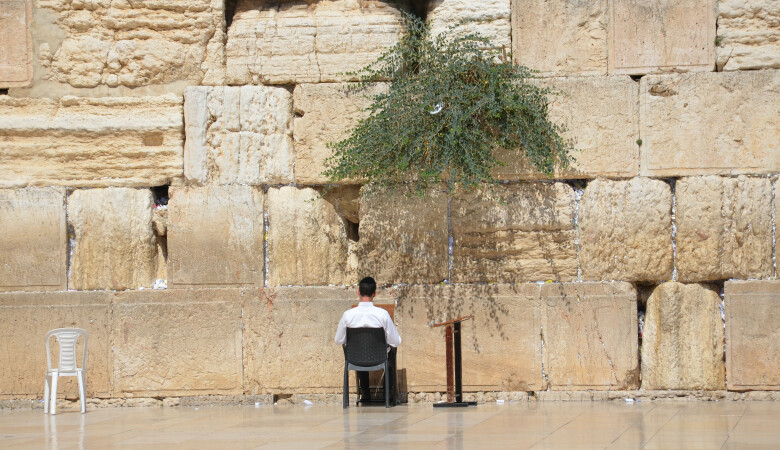Series: Mark
Jesus Proves the Resurrection by Scripture (Mark Sermon 62)
September 24, 2023 | Andy Davis
Mark 12:18-27
Resurrection of Christ, Omniscience of God
Jesus proved resurrection with scripture to the unbelievers Sadducees. After His own resurrection, we have evidence that God sovereignly will raise all who died in Christ.
- SERMON TRANSCRIPT -
A number of years ago, I was in an old cemetery in the center of the state of Kentucky. I was going through that area and there was this old kind of country church, and as often happens with these country churches, there was a cemetery connected with it, and I was walking through it. I came to a headstone that had been completely weathered, effaced by wind and rain and time. Based on the dates that were on the stones around it, probably in the latter part of the 19th century, quarter of the 19th century, 1870s, 1880s. As I knelt down, I could feel with my fingertips some slight indentations on the headstone, but I couldn't read any letter, not a single letter. I thought, "Who was this person? What did they do? How long did they live? Male or female? Is there anybody alive today in that area that would know who that person was?" I thought about the finality of death and how awesome an enemy death really is, how all of the glory of humanity is stripped away by death.
Within a short amount of time in most cases, there's not a person on earth that remembers that that person ever lived. The book of Ecclesiastes faces these truths square on and speaks bleakness over human life, vanity of vanities. Everything is vanity. Everything we put our hand to is vanity. Ecclesiastes 3:20, "We come from dust and to dust we return." All of our great projects, we have to entrust them to someone else who didn't build them, and who knows what's going to happen with them. Within a short amount of time, all that we have constructed becomes destructed, blows away like chaff in the wind. ,Ecclesiastes 9:6, "The dead in the grave. They know nothing,” the writer says. "All of their loves and hates their envys and their achievements are forgotten." Ecclesiastes, I think, the way I look at that book, is that's what life would be like if there is no resurrection from the dead. But friends, I stand before you today to say that there is resurrection from the dead, therefore our labor in the Lord is not “vanity of vanities.” The things we do in the Lord will last for all eternity. They will have eternal consequence.
Apostle Paul on trial for his life stood before the Sanhedrin and said these words, "I stand before you today because of my hope in the resurrection from the dead." I feel like as a preacher today, that's what I'm doing. I stand before you today because of my hope in the resurrection from the dead. But that's insufficient. I stand before you today on behalf of your hope in the resurrection from the dead, my hope and your hope, and I want our hope to be robust. I want it to be fed today, and there's only one food for that hope and that is the Word of God. Only by the Word of God can our hope in the resurrection from the dead be strengthened.
I. Is Death the End?
So the question in front of us, because of these Sadducees that came to question Jesus, is, "Is death the end?” Job asked this question. Job 14:14, "If a man dies, will he live again?” We walked through the Book of Job and we saw that despite remarkable faith at the beginning of his trial, Job was worn down by the sorrows, worn down by the grief, and began to say some things that were, putting it gently, questionable. He wrestled it seems with doubts concerning death in that very chapter in which he raises the question, "If a man dies, will he live again?" He seems to say, "I don't think so." In Job 14:7-12 he says, "At least there is hope for a tree. If it is cut down, it will sprout again and its new chutes will not fail, but man dies and is laid low. He breathes last and is no more. Man lies down and does not rise. Until the heavens are no more, men will not awake or be roused from their sleep." Praise God, that's not true. But Job had never seen any evidence to the contrary, neither have we with our own eyes.
When I was preaching through Job, I made this statement, “Job is a better man than any of us will ever be, but we have a better hope than he ever had.” Hallelujah. We have a better hope. Christ is that better hope, and we're going to see that in this sermon all over the world people are yearning for an answer to death. You see evidence of it in the mausoleums and the different things, artifacts that people do in connection with funerals. The pyramids of Egypt were built in preparation for the Pharaohs to live after death. They were arranging a bunch of things they thought they might need in the next life.
So also the emperor of China centuries ago, millennia ago, crafted a vast terracotta army to be with him, to fight there. I don't know how much those terracotta soldiers would do for him, but there it was. That's what he was yearning for. A coin was placed in the mouth of the dead by the ancient Greeks to pay the ferrymen for a boat ride across the river Styx, the River of Death. Some plains Indians buried dead warriors with a horse with a bow and arrow to help them hunt in the next world. So also, Eskimos of Greenland bury a guide dog with deceased person to help guide them through the cold wasteland of death.
Ecclesiastes says, Ecclesiastes 3:11, that "God has set eternity in the hearts of men.” We have a sense that death is an interloper, an enemy, it shouldn't be there, something's wrong here. We don't have an answer. Now we're surrounded by scientific unbelief on this question. We live in a very scientific region of the country. This area's growing by leaps and bounds, population wise, and tons of people pouring in here to work in the RTP, the semiconductors, pharmaceutical research, all of that. I'm aware of the atheistic materialistic mindset concerning this question. It goes something like this: Death can be described as the failure of a body to metabolize. Once you're dead, you're dead. Asking what lies in store for us after death is about as meaningful as asking what you remember from before your birth with pretty much the same answer. Before your birth you didn't exist, and after your death, well you won't exist either. So in short, you will not be around to worry about it. But never fear. If you make use useful use of your potential, what you are, what you can become, what you want to be, you'll enjoy the ride. Remember to stop and smell the roses along the way because you'll never get the chance again. Sounds like the biblical statement, "Let's eat, drink, and be merry for tomorrow we die." If there's no resurrection from the dead, just get as much joy as you can out of life because that's it.
So for centuries, skeptics have doubted the existence of the afterlife, and the Sadducees were Jesus's generation version of that. We're called on as a church to reach people who are without hope and without God in the world. Of the essence of being without hope is this question of life after death. They don't believe in it, they don't think it can happen or they don't know what it is.
"So for centuries, skeptics have doubted the existence of the afterlife, and the Sadducees were Jesus's generation version of that. We're called on as a church to reach people who are without hope and without God in the world."
II. The Sadducees: Enemies of the Resurrection
But I love this encounter that we're about to walk through between Jesus and the Sadducees who are very clever. Do you get the sense, witty and clever, they’ve got this whole test case worked out? They’re coming, these witty, clever debaters thinking that they have proven that there can be no resurrection from the dead based on this test case. Imagine them debating with the man who said, "I am the resurrection and the life. He who believes in me will live even though he dies, and whoever lives and believes in me will never die." That's who they're debating.
So we're going to walk through this. We are at verse 18. We're dealing with these Sadducees, the enemies of the resurrection, the Sadducees who say there is no resurrection, who came to Jesus with a question. The Sadducees were a religious sect, the most powerful in terms of political power and money, and control of society. They were aristocratic. They controlled the temple and the priesthood, the Sanhedrin. It was through their corrupt control of the temple's sacrificial system that they became fabulously wealthy. They were pro-Roman because they drive their position from Roman consent. So that's who they were. Spiritually, they're kind of an odd combination of weird literalists as we're going to see in the text today, but also unbelievers who denied the scripture. They say there is no resurrection and there are neither angels nor spirits [Acts 23:8].
III. Their Test Case: Marriage at the Resurrection
They bring their test case, and it's about marriage at the resurrection. Look at verse 19-23, “‘Teacher,' they said, ‘Moses wrote for us that if a man's brother dies and leaves a wife but no children, the man must marry the widow and have children for his brother. Now there were seven brothers. The first one married and died without leaving any children. The second one married the widow, but he also died leaving no child. It was the same with the third. In fact, none of the seven left any children. Last of all, the woman died too. Now at the resurrection, whose wife will she be since the seven were married to her?’”
Here we go again. This is the last week of Jesus's life. Jesus's enemies are coming at him in waves, one after the other trying to trick him or trap him or box him in some way, just like the Pharisees and Herodians had come with the question on paying taxes to Caesar that we walked through last week. They're going to try to do the same thing. The Sadducees are trying to trap Jesus with this whole thing. They figured they got this thing all worked out.
But Jesus cannot be tricked. He cannot be trapped. His mind soars infinitely higher than theirs. Isaiah 55:9 says, "As the heavens are higher than theirs, so are my ways higher than your ways and my thoughts higher than your thoughts.” They come with this test case from the books of Moses, from Deuteronomy, it's called Levirate marriage. In that, the law of Moses stated that a Jewish man is required to marry his deceased brother's wife if they have no children and raise children in his brother's name so his name will not disappear from Israel and his property can continue as well. That's a system set up in Deuteronomy 25:5-6, a true law.
But they're coming with a ridiculous test case that I have to say I'm highly skeptical ever happened. This is like some parable or something they came up with. It's like, "Ah, what about this? What if this happened?" All right. Seven brothers, all of them unmarried, stair step brothers, I would guess, over maybe, I don't know, 18 months between each one, something like that. We're going to go with it. Let's just try to figure out this test case. The first one takes a wife and then tragically dies without children. It's very sad. And then the next one steps up. I picture them like standing in a line here. It's hard for me to do this with a straight face, but there they are standing in a line. And then that one dies without children and then the next one and the next one and the next one and so on down to the seventh. They all die without children and finally the woman dies. The point is they're all dead. Seven brothers and one woman at the resurrection. Whose wife will she be since they all married?
Now their assumptions are that the next world will be essentially like this one. You're raised up into the same life that we have now, and that's not true. There is continuity but difference. It's very important we understand continuity and difference.
Their second assumption is that while in those days and before that, polygamy may have been acceptable because frequently kings, like David, had multiple wives. Polyandry, which is one woman married to seven men, that is not acceptable. That could not happen. That's a basic assumption to their argument. So bottom line, resurrection cannot happen. That's the whole approach.
Jesus answers them. "Are you not in error? You are in error." Jesus is the judge of all the earth. He gets to make these kinds of pronouncements. "You're wrong. You're in error. Let me tell you how." He addresses thoughts, motives, lifestyle, everything. He also addresses doctrine. He addresses issues of truth and error and He always judges by what is right and He judges by scripture.
We live in a day and age in which absolute truth is questioned. Truth for me, truth for you, et cetera. That's the world we live in, postmodernism. We're defining our own realities for us even to the point of gender or other things like that. We can define it for ourselves. Jesus believed in absolute truth. He believed in standards, believed in judging, saying to people, "You're in error." There is truth.
What gave him the right? God gives him the right. John 5:22-23 says, "The father judges no one but has entrusted all judgment to the son that all may honor the son even as they honor the Father.” Jesus is positioned as judge of all the earth. He will judge our doctrines. He will judge our lifestyles, the attitudes and motives. He'll judge it all. Therefore, Jesus in his ministry through the scripture, gives all of us the same invitation which He gave to Pontius Pilate. For this reason, John 18:37-38, "For this reason I was born and for this I came into the world to testify to the truth. Everyone on the side of truth listens to me." Jesus is testifying to the truth. He's telling the truth, leading people to the truth. Sadly, Pilate sarcastically said, "What is truth?" and didn't wait around for the answer, implying, like an early version of a postmodernist, there is no truth. But there is. You're in error, Sadducees.
It came from two related forms of ignorance. "You're in error," He said, "because you do not know the scriptures or the power of God. That's the source of your error, you not know. Ignorance, willful, sinful ignorance concerning these things. First of all, you don't know the scriptures. Now we can be familiar with the Bible, but it doesn't mean we know it, not like that. The Sadducees would've been offended at this statement. They actually came to Jesus in the name of the Levirate marriage command from Moses. They didn't know the scriptures like they needed to. There's a vast difference between being familiar with or knowing the words of the scripture and understanding the truth, understanding the Word of God. They did not know the scriptures. Jesus is about to refer to a very familiar passage, but they didn't understand it properly, the burning bush.
I just want to make an application for you all, First Baptist Church, all of you, never stop learning the Bible. Drink it in, feed your souls on it. You don't know it as well as you think you do. By God's grace, you don't know it as well as you will a year from now. Never stop learning, never stop being hungry for the Word of God. It says more than you think it does. The thing that's beautiful about the Bible is the milk is so clear, so simple, a child could understand it. That's what you need to be saved. But there's more in there than milk. There's a lot that we need to learn just be feeding on God's word. It's a saying, "familiarity breeds contempt." "You're in error," Jesus said, "because you don't know the scriptures," and then, "or the power of God."
"Never stop learning the Bible. Drink it in, feed your souls on it. You don't know it as well as you think you do. By God's grace, you don't know it as well as you will a year from now."
Power here means God's ability to do anything that He wills to do. Omnipotence, the Sadducees probably denied the bodily resurrection because they didn't see how God could do it. There seemed to be insurmountable logistical problems. The body's destroyed at death. Within a certain amount of time worms completely devour it. There’s nothing left but skeleton. If it's an incineration kind of situation, maybe that's burned to dust. It's all gone. How could it ever? God could never reassemble the body. It can't happen, so they think God cannot do it. They don't understand the power of God.
I believe, by the way, this is the very reason why the apostle Paul in 1 Corinthians 15, when he is addressing philosophical opposition to the resurrection from the dead, "How can some of you Corinthians say there is no resurrection from the dead?" , it’s the same thing like the Sadducees. Later on in 1 Corinthians 15, he says, “Some of you will ask, ‘What about the resurrection body? What kind of body will it come?’ He answers, ‘How foolish.’” That's an interesting rebuke there. Why does he say that? "How foolish." Then he goes on to answer the question, which we'll talk about in a minute, the nature of the resurrection body. Why is he saying, "How foolish"? I think this is the issue. They don't see how it can happen, so they think it can't happen. That's foolish. Our God is the God who calls things that are not, as though they were and gives life to the dead. Romans Chapter 4, “He created everything out of nothing by the Word of His power." Is there anything too difficult for God? You don't understand the power of God. The philosophers in Athens on Mars Hill, they sneered when they heard about the resurrection, mocked it, thought it was foolish. "Why would anyone want to be raised again," they think. In the same body, again back into the same life, the body is negative, the spirit is positive. Why would you want that? They sneered, they mocked.
And so it is today, the urbane, witty, scholarly atheists of our day mock our faith. Now for me as a pastor, just in general, together with the other elders of the church, I am responsible for the doctrinal health of this church and the lifestyle of this church, and as well, responsible to line it up with scripture. I think this is one of the key phrases that I use. “You're in error because you don't know the scriptures or the power of God.” So again and again on every topic we bring Romans 4:3, that one statement, "What does the scripture say?"
All controversies, in any topic that comes up, in my opinion are because those people, we, us, don't know the scriptures or the power of God. Debates over predestination, divorce and remarriage, gender based roles in the church, complementarianism, charismatic gifts, whatever, whatever's in your mind that's controversial and you want to talk to me about, all those debates and discussions, the disagreement comes because one or both parties, they're in error because they don't know the scriptures or the power of God.
IV. Jesus’ Timeless Answer: “I Am Abraham’s God. . .”
Now Jesus begins, interestingly, his answer with a revelation of something entirely new that's not related anywhere in scripture. It's quite remarkable. My sermon title is “Jesus Proves Resurrection from Scripture.” This isn't scripture before He spoke it. Once He spoke it became scripture. So we're reading it. But before that, there's nothing in the 39 books of the Bible about marriage at the resurrection. You're not going to find it.
Jesus is prophet, priest, and king. And as a prophet, He gets to teach us new things that we didn't know anywhere else, and this is a new thing. Look at verse 25, "When the dead rise, they will neither marry nor be given a marriage. They will be like the angels in heaven." I have searched the 39 books of the Bible. You're not going to find it anywhere in the Old Testament. This is new.
Does Jesus have the right to do that? He does. He has the right to teach us new things and that's what He does here. What He teaches is consistent with other doctrines in the Bible, connected with the resurrection, consistent, but it's new. The implications are the next world and life therein will be in some way significantly different than the life we have now. There'll be some significant disconnects, but there will be continuity or else we wouldn't use the word “resurrection". Resurrection means something was lifted up, something was raised, there's continuity, but difference.
In the present world, vital to the mandate God gave to Adam and Eve was, "Be fruitful and multiply. Fill the earth and subdue it.” Have children, procreate, and marriage is given for that. One man, one woman in covenant relationship for life, that's what sex is for. The two become one flesh in marriage. That's God's intention. But in the next world, procreation it seems will no longer be needed. The number of human souls, human beings, will be fixed, done. There are no new people. He also teaches us something about angelic life. But we're not taking that off ramp right now to go off and say, "Angels don't marry," but that's what He says.
Next, Jesus proves the resurrection by scripture. He goes to an amazingly familiar passage, the burning bush account. Now as I look over, and I did this with Job, I tried to say, "Does the Old Testament teach resurrection?", and it does. There's some key verses. Jesus could have gone to Psalm 16, where David writing under the inspiration of the Holy Spirit says, "You'll not abandon me to the grave, nor will you let your holy one see decay." Peter quoted that on the day of Pentecost, Jesus could have gone there. He could have gone to Isaiah 26:19, which says, "Your dead will rise. Their bodies will live. You who dwell in the dust, wake up and shout for joy." Or Daniel 12:2, "Multitudes who sleep in the dust of the earth will arise.” Those are pretty clear, but that's about it. There's not a lot of others. There's a lot more about blood atonement, his death on the cross in prophecy, than there's about his bodily resurrection. I think the reason for that is Jesus preferred to show us. He preferred to say, "Touch me and see. Look at my hands and feet." He wanted to live it out. Then the apostles proclaimed it, and we got all of these verses in the New Testament that are clear about it. Jesus opened wide the gates of Hades.
But there are prophecies and He goes to this burning bush. Look at verse 26- 27, “Now about the dead rising, have you not read in the book of Moses in the account about the bush, how God said to him, ‘I am the God of Abraham, the God of Isaac, and the God of Jacob.’” He is not the God of the dead but of the living. You are badly mistaken.
In Matthew's account, Jesus introduces scripture beautifully. "Have you not read what God says to you?" Isn't that beautiful? When you read Exodus 3, the burning bush, God is saying this to you, “Now the word of God is living and active.” He's really saying it to you. Now I know He said it to Moses, but that's how it was introduced. Moses wrote it down. He's saying it to them now. The root problem is the Sadducees do not believe God speaks through Scripture, therefore, they don't understand the relationship God had with Abraham, Isaac, and Jacob. How does this prove resurrection? That's a head scratcher. It's like, "Help me Jesus, help me. Holy Spirit, help me understand how this proves bodily resurrection from the grave. It's not obvious." Isaiah 26:19, "Your dead will live. Their bodies will rise. You who dwell in dust, wake up and shout for joy." That's pretty straightforward. I like that.
But how does the burning bush prove bodily resurrection? It's not the same. It's interesting why He would choose that, but it all comes down to the grammar, the present tense. "I AM the God of Abraham," and I'm going to put it in "I AM”, "I AM the God of Isaac and I AM the God of Jacob.” Remember that that "I AM" statement is the key assertion, the key revelation. What is your name? "I AM," "I am the I AM." But He zeroes us in. "I AM the God of Abraham." What He's saying is, "I am Abraham's God right now. Abraham and I are continuing our friendship." Abraham is called the friend of God. "We're continuing our friendship now. I am Abraham's God and I am Isaac's God and I am Jacob's God right now.” At least that means that they have continued awareness and existence after death. But it doesn't prove bodily resurrection, not yet, but it just shows that the fundamental concept that you cease to exist at death is false. It is not true. "I am Abraham's God right now."
But essential to this is God's original purpose in giving human beings a body to begin with. Why did He make us with bodies? Why did He put together a body for Adam? Why did He give him eyes and hands and feet and ears and all of that? And how is it that humans lost their bodies? It's called death. The separation of the soul from the body is death. That's separation. We believe that spirits, souls can, do have a continued existence apart from the body, unlike atheistic, materialistic types that say all of these things are biochemical illusions in the brain. That's false. There is something called the soul and it continues to exist. And those believers who died, they are absent from the body, present with the Lord. I believe the thief from the cross is absent from the body, present with the Lord. Jesus said, "Today you'll be with me in paradise." He's in relationship with God, but he doesn't have a body.
But will he get one? Yes, he will. Why? Because that's God's purpose. He will not be defeated by death. When Jesus did all those healings He is saying, "God didn't make the eyes to be blind." So He touches the blind man. "Now I can see." God didn't make the legs to be lame. So He touches the lame person. Now they can walk like God intended its original purpose. What was his intention? So it is with the entire function of the body, completely destroyed by death, restored by resurrection. How beautiful is that? So that's how the argument works.
I will say better proof than this awaits, clearer proof. I don't deny that this is a difficult argument. But Jesus's own resurrection from the dead clearly recorded for us in Matthew, Mark, Luke, and John is better evidence that the dead can rise. So also, all of the doctrinal instruction entrusted to the apostles to explain it all as eyewitnesses is better. There is such a thing according to the author of Hebrews, a “better hope,” [Hebrews 7:19] founded on better promises. Better, better, better promises. I've already given you the best one. John 11:25-26, "I am the resurrection and the life. He who believes in me will live even though he dies and whoever lives and believes in me will never die."
Jesus asked Martha, "Do you believe this?" I'm going to stop and say, do you all believe this? Do you believe in the resurrection from the dead? Yes. Amen. If you came here as a guest or just a visitor and you have not yet come to faith in Christ, I'm here to tell you today that Jesus has triumphed over the grave. And I believe that it is natural to the as yet an unbeliever, to be afraid of death, to be enslaved through fear of death. Let Jesus set you free. All you have to do is trust in him, his blood shed on the cross, sufficient for the forgiveness of all of your sins, past, present, and future, and a promise based on John 11 that you'll live forever. Trust in Him. That's a better promise.
Or how about this one, John 6:39-40, "This is the will of Him who sent me that I shall lose none of all that He has given me, but raise them up at the last day, for my Father's will is that everyone who looks to the Son in faith and believes in Him shall have eternal life and I will raise him up at the last day." That's the promise of resurrection. So clear.
Or 1 Corinthians 15:20, "Christ has indeed been raised from the dead, the first fruits of those who have fallen asleep.” It is a vast harvest yet to come. Now about the resurrection of the dead, "Well, what kind of body will they have? How foolish." Then He tells us what kind of body we'll get. 1 Corinthians 15:42-44, "So it'll be with the resurrection of the dead. The body that is sown is perishable. It is raised imperishable. It is sewn in dishonor. It is raised in glory. It is sown in weakness. It is raised in power. It is sown in natural body. It is raised a spiritual body." You're going to get, if you're a believer in Christ, a resurrection body characterized by these words, imperishable, glorious, powerful, and spiritual. That's where we're heading.
The best proof of all, Luke 24:36-40, "Jesus himself stood among them and said to them, 'Peace be with you.'They were startled and frightened thinking they saw a ghost. He said to them, ‘Why are you troubled? Why do doubts rise in your minds? Look at my hands and feet. It is I myself. Touch me and see. A ghost does not have flesh and bones as you see I have.’ And when he had said this, he showed them his hands and feet.” Now here's the thing, you're not going to be able to touch him and see. You have to believe based on scripture. It is by the scripture alone that you'll believe in the resurrection from the dead. It's the only way. But we have these beautiful historical accounts of eyewitnesses to the resurrection of Jesus who actually did or were able to touch Him and see, like Thomas. "Put your hands in my wounds." Hand on the side, stop doubting and belief.
Jesus said in John 20, "Because you have seen me, you have believed. Blessed are they who have not seen and yet have believed." That's all of us today who are believers in Christ. We have not seen, and yet we have believed based on what? Scripture's testimony. The Old Testament, yes, but even brighter in the New Testament. Christ has risen. And because of that better hope, because Jesus said, "Because I live, you also will live," because of that, the Apostle Paul just did so much better than Job when it came to questions of the grave. He says, "For me, I desire to depart and be with Christ, which is better by far. For me, to live as Christ and to die as gain.” It's gain. It's better, more Christ. That's all that means. Live as Christ. And to die is to get more Christ, to see Him face to face and to be with Him.
Paul said in 1 Thessalonians 4, “We believe that Jesus died and rose again. And so we believe that God will bring with Jesus those who have fallen asleep in Him. According to the Lord's own word. We tell you that we who are still alive, who are left to the coming of the Lord, will certainly not precede those who have fallen asleep. For the Lord himself will come down from heaven with a loud command, with the voice of the archangel, with the trumpet call of God and the dead in Christ will rise first.” Praise God.
V. Application
To sum it all up, the Sadducees were just wrong. They were wrong. You know what that means for all of us who are Christians? The best is yet to come. The best is yet to come. Even when you're on the deathbed, if you're in the ICU and you're dying, the best for you is yet to come. You're looking ahead to a glorious world.
And I'm going to extend that, friends, to marriage. I know Jesus said they'll neither marry nor be given a marriage, but that doesn't mean that the relationship between Christian spouses will be over. Not at all. What do you think your relationship with your Christian spouse will be like in heaven? Better, same or worse? You're like, "Oh, Pastor, I'm hoping better. I definitely want better." Look, even if you have a wonderful marriage, if you have a wonderful marriage, you do not have the level of unity with your spouse that you will have in heaven because Jesus prayed in John 17, "Father, may they be brought to complete, to perfect unity. As the Father and the Son are one, we are going to be one with each other.” So that's what I call super marriage, the best possible thing. You and your spouse will perfectly agree. But both of you'll have some learning to do. But that's our future, our oneness with each other. It's beautiful. No sex, no procreation, but infinitely better relationship.
Then concerning the ongoing life we have with the doctrine here, our job as elders, but all of us as Christians, is to fight the ways that we are in error because we don't know the Scriptures or the power of God. All of our sins that we commit are because of faithlessness, because we've not trusted in the God of the Bible, because we've not believed in Him. We've not believed that God was strong enough to help us put that troubling sin to death, to mortify that sin habit. God is powerful. He can do it. The Scriptures tell you to put sin to death, but you think that you can't do it. It's too strong. Satan's lying to you. God is powerful through the spirit to mortify sin. And the same thing with our witness. God is powerful. You'll see power when the Holy Spirit comes on you. We're in error in not witnessing because we don't know the Scriptures or the power of God.
I would urge you to meditate on God's omnipotence, that God is able to do immeasurably more than all we ask or imagine. And when it comes to personal holiness, say, "I don't want to be in error anymore because I don't know the scriptures or the power of God. I want to live a holy life."
Concerning our witness, we are strategically positioned here to speak to people who are without hope and without God in the world. Let's be so buoyantly filled with hope in the resurrection that people ask us to give a reason for the hope that we have. One of the pastors that spoke at the 9Marks conference that we hosted over the last couple of days, H.B. Charles, a godly man, said that his church has seen an unbelievable upswing in members sharing their faith and winning people to Christ in baptisms. I said, "How did that happen?" He said, "You remember a number of years ago, the SBC had a, "who's your one?" kind of approach. I would just commend that to all of you. That's what they did. They just said, every member of the church take responsibility for a lost person. Take them on as a project. Pray for them. Pray that you yourself will have an opportunity to witness to them and don't stop praying for them and seeking. You could say, "Well, why not who's your five? Why not who's your 10?" Well, you can do that if you want, but let's start with "who's your one?" and say for whom you going to take responsibility. It could be a neighbor, could be a coworker, could be a lost relative, somebody. Take a responsibility for a lost person and focus on that person and see where God leads.
Close with me in prayer. Lord, we thank you for the beauty of the scripture. We thank you for the power of the Word of God. Thank you for the truth of the resurrection. Thank you for the deep mind of Jesus, how he just doesn't do what we think he's going to do. I thank you for how he used this passage, "I am the God of Abraham, the God of Isaac, and the God of Jacob," to prove resurrection. I thank you that you have that intimate relationship with each one of us now through Christ. Help us to believe in it, to walk in it, and to be filled with hope and help us to be faithful in putting sin to death and being witnesses to this world that is so hopeless. In Jesus' name. Amen.































